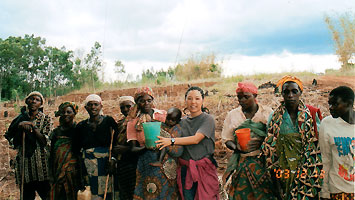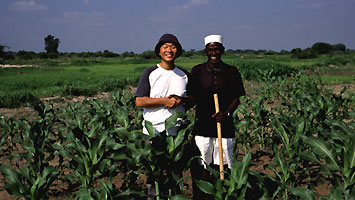- July - September 2003: IKENO Jun; "On-Site Education and Research on Poverty Problems in Rural Areas of Tanzania". Visited villages covered by the sustainable rural development project of the Centre for Sustainable Rural Development, Sokoine University of Agriculture (SCSRD). Exchanged views with SCSRD researchers on the reduction of rural poverty
- October 2003 - February 2004: OGAWA Sayaka; Research on "Historical Changes of Second-hand Clothing Trade and Comercial Practices by Small-scale Merchants in the Urban Tanzania", Research in port for understanding the import of foreign products following the economic liberalization; Gathered documents on the history of policies toward the informal sector and city planning of Mwanza
- October - December, 2003: KONDO Fumi; "Agro-ecological Study on the Development of Indigenous Cropping System in the Southern Highlands of Tanzania"
- November 2003: ITANI Juichi; "Management and Improvement of the Field Station and On-Site Education"; Held consultations at SCSRD for the implementation of collaboration research
- December 2003 - March 2004: MHANDO, D. G.; "Farmer's Coping Strategies under the Changes of Coffee Marketing System after Economic Liberalization :The Case of Mbinga District, Tanzania"
- February 2004: HASEGAWA Tatsuo;"Changes of the Management and Strategy of Agro-Pastoral Livelihoods in Gogo Society, Central Tanzania"


- Facility:
Seminar room, study rooms (4), living room, garage, warehouse and others. - Equipment:
Communication equipment (telephone, satellite telephone, mobile phones), laptop computer, printer, liquid-crystal projector, set of measuring equipment, digital camera, tent, sleeping bags, etc.
The TFS has a full-time watchman and security service by a private security firm. To conduct a survey in Tanzania, researchers must stay in Dar es Salaam for at least two weeks to obtain their research permit and residence permit. The TFS is effectively used as a safe accommodation on such occasions.
At the TFS, open seminars are organized with the participation of resident researchers in Tanzania, researchers from other institutions and dispatched ASFFAS students. At the first TFS seminar was held in November 2003, ASAFAS students, SEKO Sayaka (enrolled in FY2001) and KAWANISHI Yoichi (enrolled in FY2002), presented progress reports on their fieldworks, and in the second seminar in February 2004, another ASAFAS student, HASEGAWA Tatsuo (enrolled in FY1999), presented the findings of his research. The seminar offers participants an opportunity to exchange multidimensional opinions from researchers of different disciplines and people having various information of Tanzania, and studies can be deepened in an interdisciplinary manner. Further, having the opportunity to make a presentation at a seminar on the way of or at the end of long fieldwork helps researchers to objectively re-grasp the research and to reconfirm the direction of the study. The abstracts of the presentations will be published on the website.
>>Report of Faculty Members:FY2003
>>Report of Students:FY2003